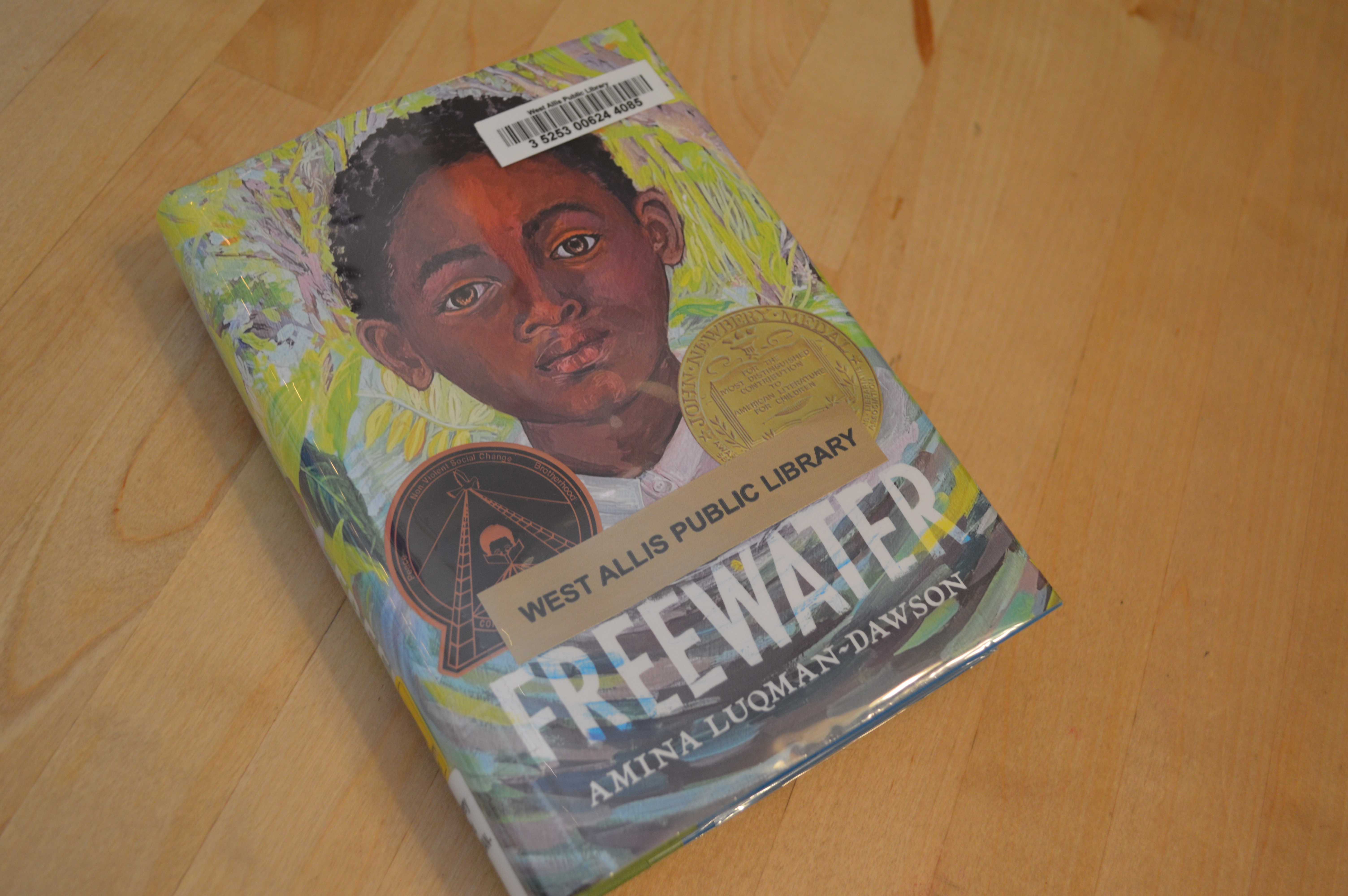
2023 Newbery winner (I know, you thought I was done with them!), Freewater by Amina Luqman-Dawson is a tale about Homer and Ada, two enslaved children running away from a plantation to a secret swamp maroon community called Freewater. Told from various points of view, Freewater follows many characters traveling to and from the maroon community through the swamp, dodging snakes and slave hunters through dangerous paths with sharpened stakes, homemade canoes, and sky bridges. The book has five main narrators: Homer, who along with his little sister Ada have only known slavery, Anna an enslaved friend who they had hoped to bring along, but along with their mother, Rose, got left behind, Nora a white girl with a large congenital birthmark ignored by her plantation owning parents, Billy a runaway slave who came to Freewater years before with his father but memories of his enslaved past still haunt him, and Sanzi a wild and bold girl who has only known the maroon community and dreams of adventure. Together Homer, Ada, Billy, Sanzi, her beautiful older sister Juna, and angry, dangerous Ferdinand go back to try and rescue Rose and Nora from the plantation in the middle of a wedding.

What I liked. I thought that the ending (without going into spoilers!) was really strong. Every character (and there were a lot!) got to grow, face challenges, and really have a satisfying ending. I love a good ending, and this was so skillfully done. Also the wild and wonderful Suleman was a sort of Robinhood of Freewater and was such a great character. (Also, I listened to this book on audio, narrated by Cary Hite and Sisi Aisha Johnson, which was very well done.)

What I found interesting. So many details of enslaved and maroon community life were fascinating, like the role of written passes or ways in which the swamp community created what they needed. The book seemed really well researched, and had a great “Note from the Author” at the end with a lot of facts about what we do know about these maroon communities and the historians who have researched them.

What were some limitations. The only thing that I can think of in this category is that while there was a description of religion within the swamp community, it seemed a little thin. Mrs. Light presided over Freewater’s own kind of religion that involved using the swamp’s plants and herbs for medicine and praying and thanking the swamp as a kind of mother goddess for protection. This seemed like a very authentic representation of how through the history of enslaved African people in America they kept African belief systems alive and combined them with herbal medicine, charms, and conjurers. But there wasn’t any discussion of how Christianity (or Islam) was different from those beliefs, or was combined in a synchronous way. I would have thought that Homer would have been surprised by the Freewater belief practices when he came there. But, the book did deal with so many things already, that perhaps getting bogged down in that discussion would have taken away from the plot.

Similarity to other Newbery winners. Other Newberies that specifically deal with freeing enslaved people include Amos Fortune, Free Man by Elizabeth Yates (1951) in which the enslaved Amos is able to purchase his freedom, The Slave Dancer by Paula Fox (1974) at the very end of which Jesse helps (or at least doesn’t hinder) an enslaved boy escaping into the woods of Mississippi with hopes of heading north, A Gathering of Days: A New England Girl’s Journal by Joan Blos (1980) in which Catherine leaves supplies for a slave traveling along the underground railroad north, I, Juan de Pareja by Elizabeth Borton de Treviño (1966) who is an enslaved Spanish artist who is granted his freedom at the end of his artist master’s life, and Rifles for Watie by Harold Keith (1958) about the Civil War including some former enslaved characters. That’s kind of a lot, isn’t it? And even though Roll of Thunder, Hear My Cry by Mildred Taylor (1977) is a book about the 1930s (not during the time of slavery), the strong parents, and a semi-separate but precarious black community in the South reminded me of Freewater. In terms of a band of somewhat misfit kids undertaking a journey and a crazy endeavor, that reminded me of recent Newberry winners like Moon Over Manifest by Clare Vanderpool (2011), Flora & Ulysses: The Illuminated Adventures by Kate DiCamillo (2014), Hello, Universe by Erin Entrada Kelly (2018), and The Last Cuentista by Donna Barba Higuera (2022).

What it teaches me as a writer. I was so impressed by how Amina Luqman-Dawson had such a big, rich cast of characters, some of whom were downright unlikeable, worked together, and came together in a great ending. About half way through the book, I wasn’t sure about the character of Sanzi. She was so impulsive and made such a mess of things, that while I did like her, she was kind of frustrating and I cringed a lot during her chapters. But by the end of the book she had grown so much, (and grown on me I guess) that I really liked Sanzi, and she had a great ending. I had a similar experience with grumpy Ferdinand.

Have you read Freewater? What are your favorite historical fiction books, especially ones that take you into little known communities or experiences?
*Note* This post contains Amazon affiliate links, which means if you were to buy a book, I’d get a tiny commission at no cost to you. Thanks for supporting Stories & Thyme!*